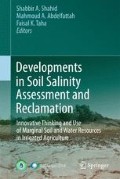Abstract
Two major types of salt-affected soils were distinguished in the study area: saline and alkali (sodic) soils. Saline soils have an excess of neutral soluble salts such as chlorides and sulphates of Na+, Ca2+ and Mg2+. Plant growth is adversely affected due to reduced water uptake and ionic imbalance and/or nutrient stresses. Alkali soils, on the other hand, have Na2SO4 and NaHCO3 which upon hydrolysis produce alkalinity leading to high pH and exchangeable sodium, nutrients unavailability and low yields. The reclamation technology involves integrated use of amendments like gypsum for rice-based cropping system, balanced and integrated use of chemical fertilisers and organic/green manures improving soil health and input-use efficiency. In saline soils, leaching with good-quality water and sub-surface drainage is essential. Use of poor-quality ground water constitutes about 30–80% of total ground water. The management practices for optimal crop production with saline and sodic water irrigation must aim at preventing the build-up of salinity/sodicity and toxic ions in the root zone, to levels that limit the productivity of soils, control the salt balances in soil-water system as well as minimise the damaging effects on crop growth. Efficient, balanced and integrated nutrient management strategies are extremely important to increase yields to match the potential yields obtained under good-quality irrigation water. Therefore, we focus on the ionic interactions and nutrient dynamics as influenced by salinity/sodicity of irrigation water and discuss how these issues relate to the nutritional problems and suggest long-term remedial measures to utilise poor-quality waters for improving and sustaining crop productivity of salt-affected soils.
Access this chapter
Tax calculation will be finalised at checkout
Purchases are for personal use only
References
Kumar D, Swarup A, Kumar V (1995) Effect of rates and methods of urea-N application and pre-submergence period on ammonia volatilization losses from rice fields in a sodic soil. J Agric Sci (Cambridge) 125:95–98
Kumar D, Swarup A, Kumar V (2000) Effect of temperature on kinetics of urea hydrolysis and ammonia volatilization in submerged alkali soils. Fertil News 45(11):57–63
Soni ML, Swarup A, Singh M (1997) Influence of rates and methods of manganese application on yield and nutrition of wheat in a reclaimed sodic soil. J Agric Sci (Cambridge) 127:433–439
Swarup A (1984) Effect of micronutrients and farmyard manure on yield and micronutrient content of rice and wheat grown on sodic soil. J Indian Soc Soil Sci 32:397–399
Swarup A (1986) Effect of gypsum, pyrites, farmyard manure and rice husk on the availability of zinc and phosphorus to rice in submerged sodic soil. J Indian Soc Soil Sci 34:844–848
Swarup A (1988) Influence of organic matter and flooding on the chemical and electrochemical properties of sodic soil and rice growth. Plant Soil 106:135–141
Swarup A (1991) Effect of gypsum, green manure, farmyard manure and zinc fertilization on the zinc, iron and manganese nutrition of wetland rice on a sodic soil. J Indian Soc Soil Sci 39:530–536
Swarup A (1993) Integrated nutrient supply and management system for sustained crop production in alkali soils. Fertil News 38:27–34
Swarup A (1994) Chemistry of salt affected soils and fertility management. In: Salinity management for sustainable agriculture. Central Soil Salinity Research Institute, Karnal, pp 18–40
Swarup A (2003) Crop response to secondary and micronutrients in salt affected soils of India. Fertil News 48(4):83–93
Swarup A, Chhillar RK (1986) Build up and depletion of soil phosphorus and potassium and their uptake by rice and wheat in a long term field experiment. Plant Soil 91:161–170
Swarup A, Singh KN (1994) Effect of gypsum, farmyard manure and nitrogen on ameliorating of a sodic soil and on yields of rice and wheat. Int Rice Res Notes 19(3):22–23
Swarup A, Yaduvanshi NPS (2004) Nutrient stress management for sustaining crop production in salt affected soils. Bulletin no. 1/2004. CSSRI, Karnal, pp 1–35
Swarup A, Adhikari M, Biswas AK (1994) Effect of gypsum on the behaviour of phosphorus during reclamation of a sodic soil. J Indian Soc Soil Sci 42:543–547
Author information
Authors and Affiliations
Corresponding author
Editor information
Editors and Affiliations
Rights and permissions
Copyright information
© 2013 Springer Science+Business Media Dordrecht
About this chapter
Cite this chapter
Swarup, A. (2013). Sustainable Management of Salt-Affected Soils and Poor-Quality Ground Waters for Enhancing Crop Production. In: Shahid, S., Abdelfattah, M., Taha, F. (eds) Developments in Soil Salinity Assessment and Reclamation. Springer, Dordrecht. https://doi.org/10.1007/978-94-007-5684-7_21
Download citation
DOI: https://doi.org/10.1007/978-94-007-5684-7_21
Published:
Publisher Name: Springer, Dordrecht
Print ISBN: 978-94-007-5683-0
Online ISBN: 978-94-007-5684-7
eBook Packages: Earth and Environmental ScienceEarth and Environmental Science (R0)

